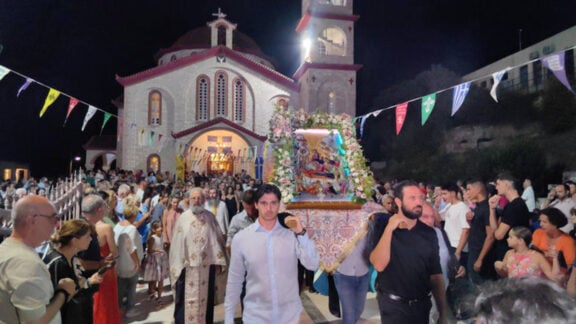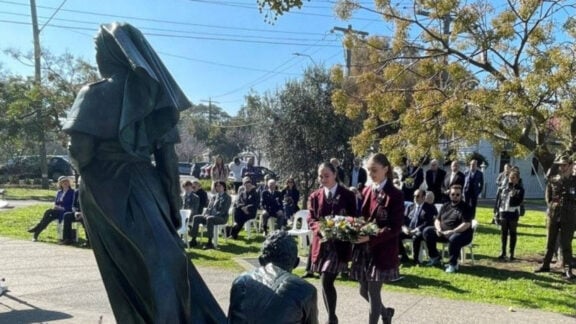With solemn grandeur, the Feast of the Dormition of the Virgin Mary was celebrated on Thursday, 14 August 2025, in the seaside village of Kiveri, within the Holy Metropolis of Argolis.
On the eve of the feast, Metropolitan Nektarios of Argolis led the festive Vespers, offering a heartfelt homily on the life and grace of the Theotokos. The service concluded with the procession of the holy icon of the Dormition through the village streets, accompanied by a multitude of faithful.
Known as the “Easter of Summer,” the Fifteenth of August remains one of the most deeply revered days in the Orthodox calendar, embodying a spirit of devotion and unity for Greeks everywhere.
Across Greece, each region venerates its own icon of the Panagia and carries its own sacred traditions. On the island of Tinos, thousands of pilgrims make the uphill journey, many on their knees, to the Church of the Evangelistria, bearing offerings, candles, and photographs of loved ones.
In Paros, the historic Panagia Ekatontapyliani fills with incense, candlelight, and the chanting of monks.

For Pontians worldwide, Kastania in Imathia and the monastery of Panagia Soumela serve as a focal point of remembrance, rekindling ancestral ties.
On Andros, the monastery of Panachrantos stands like a watchtower high in the mountains, a spiritual beacon for islanders and seafarers.
In countless villages, from Crete to Epirus, the day draws expatriates back home, filling town squares with music, food, and the warmth of reunion.
Archbishop Makarios: Dormition as inner awakening
In the Greek communities of Australia, the Feast of the Dormition carries its own special resonance. Churches become centers of both worship and cultural memory, where the fragrance of incense and the hymns of the Paraklesis services stir images of Greek summers past.
The day is more than liturgy, it is a bridge between generations, passing on the language, traditions, and faith of the ancestors to younger Greek Australians.
For the diaspora, the Panagia is both a guardian and a comforter, one who listens to unspoken prayers, consoles in hardship, and embodies the hope for peace and health.

In his message for the Feast of the Dormition of the Theotokos, Archbishop Makarios of Australia reflected on the deep spiritual meaning of the day, urging the faithful to see it not as a time of sorrow, but of joy and hope.
“With ineffable joy, ‘with psalms and hymns and spiritual odes, together with the Angels and Apostles, we celebrate with gladness’ the revered Dormition and Assumption of the Most Holy Theotokos,” he said, noting that Orthodox Christians rejoice rather than mourn because the one who bore Life itself was, three days after her Dormition, “translated to life.”
The Archbishop explained that, contrary to worldly understandings of death, the Virgin’s passing became “a passport to eternal and greater life.” As the one who at the Annunciation opened “the chapter of our salvation,” she was deemed worthy to enter, first among the human race, into the heavenly Kingdom of God.
Since then, he said, the faithful have looked to her as a loving Mother who intercedes unceasingly before the Triune God, and as a radiant guide reminding them of their ultimate destiny — eternal life.
Her earthly life, Archbishop Makarios noted, was an example of obedience, humility, and steadfast devotion. She never sought worldly honour, standing quietly beside her Son, and even when told by an angel that her departure from this life was near, she accepted it humbly and peacefully, without fear or resistance.
“In our era, which presents as role models those attached to material wealth, worldly cares, and fleeting pleasures, the Most Holy Theotokos stands before us as the undeniable sign that these things are perishable and passing,” he said. “What is attached to the earth perishes with it, but what is attached to Christ has heaven as its destination and remains forever.”
He concluded with a call to hold this hopeful message in our hearts, so that “with the intercessions of our Panagia, we may not stray from our true purpose, but be found worthy to enter the Kingdom of Heaven, where ‘there is no pain, sorrow, or sighing, but life everlasting.’”
“Many years and blessings to all!”









